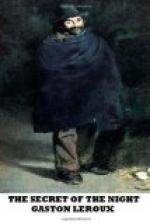“Answer, Natacha; tell me, yes or no, whether you have let anybody into this house by night.”
“Father, it is true.”
Feodor roared like a lion:
“His name!”
“Monsieur will tell you himself,” said Natacha, in a voice thick with terror, and she pointed to Koupriane. “Why does he not tell you himself the name of that person? He must know it, if the man is dead.”
“And if the man is not dead,” replied Feodor, who visibly held onto himself, “if that man, whom you helped to enter my house this night, has succeeded in escaping, as you seem to hope, will you tell us his name?”
“I could not tell it, Father.”
“And if I prayed you to do so?”
Natacha desperately shook her head.
“And if I order you?”
“You can kill me, Father, but I will not pronounce that name.”
“Wretch!”
He raised his stick toward her. Thus Ivan the Terrible had killed his son with a blow of his boar-spear.
But Natacha, instead of bowing her head beneath the blow that menaced her, turned toward Koupriane and threw at him in accents of triumph:
“He is not dead. If you bad succeeded in taking him, dead or alive, you would already have his name.”
Koupriane took two steps toward her, put his hand on her shoulder and said:
“Michael Nikolajevitch.”
“Michael Korsakoff!” cried the general.
Matrena Petrovna, as if revolted by that suggestion, stood upright to repeat:
“Michael Korsakoff!”
The general could not believe his ears, and was about to protest when he noticed that his daughter had turned away and was trying to flee to her room. He stopped her with a terrible gesture.
“Natacha, you are going to tell us what Michael Korsakoff came here to do to-night.”
“Feodor Feodorovitch, he came to poison you.”
It was Matrena who spoke now and whom nothing could have kept silent, for she saw in Natacha’s attempt at flight the most sinister confession. Like a vengeful fury she told over with cries and terrible gestures what she had experienced, as if once more stretched before her the hand armed with the poison, the mysterious hand above the pillow of her poor invalid, her dear, rigorous tyrant; she told them about the preceding night and all her terrors, and from her lips, by her voluble staccato utterance that ominous recital had grotesque emphasis. Finally she told all that she had done, she and the little Frenchman, in order not to betray their suspicions to The Other, in order to take finally in their own trap all those who for so many days and nights schemed for the death of Feodor Feodorovitch. As she ended she pointed out Rouletabille to Feodor and cried, “There is the one who has saved you.”




